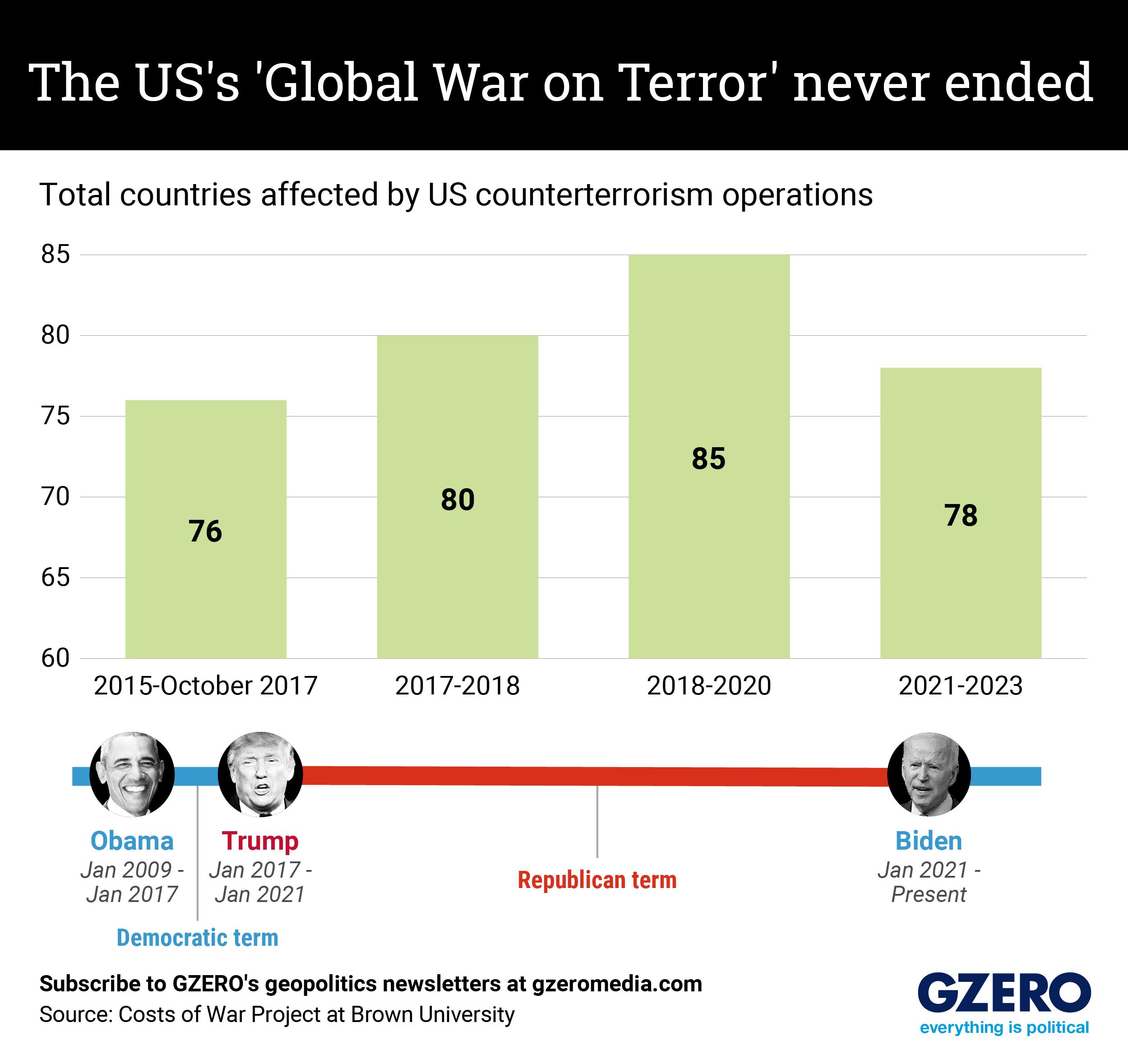December 10, 2023
Presidents Barack Obama, Donald Trump, and Joe Biden all pledged, on some level, to narrow the scope of the global war on terror and reduce US overseas military commitments.
In 2013, Obama said the US should not define its fight against terrorism “as a boundless ‘global war on terror.’” In 2019, Trump said: “Great nations do not fight endless wars.” And on the campaign trail the same year, Joe Biden vowed to “end the forever wars in Afghanistan and the Middle East.”
Yet, the number of countries where the US conducts counterterrorism operations and training has largely remained steady under all three presidents, according to data from the Costs of War project at Brown University. The study includes an array of factors, such as where troops involved in combat or potential combat were stationed, where air and drone strikes occurred, and countries where the US offered counterterrorism training or assistance.
Costs of War found that under Biden the US has conducted air and drone strikes in at least four countries – Afghanistan, Iraq, Somalia, and Syria (and likely Yemen). Its latest report also shows that from 2021 to 2023, US service members engaged in combat and detention, using force on the ground against militants/terrorism suspects in at least nine countries: Afghanistan, Cuba, Iraq, Kenya, Mali, Somalia, Syria, United Arab Emirates, and Yemen.
Comparatively, the data from 2015 to 2017 showed 15 countries hosted US combat troops involved in counterterrorism operations, and air and drone strikes occurred in seven.
The forever war continues. Biden did pull US troops from Afghanistan, ending the longest conflict in US history, but the war on terror still grinds on in other countries under his watch – though often in far more covert ways than when the military campaign first began.
American taxpayers continue to foot the bill of this war, which has already cost more than $8 trillion. Meanwhile, there hasn’t been a terror attack in the US on the same scale as 9/11 in the time since, but critics of the war on terror say it’s locked America into an unwinnable, never-ending conflict.More For You
What We’re Watching: US critical minerals summit, Rafah crossing reopens, Border violence in Pakistan
Feb 02, 2026
U.S. President Donald Trump and Japanese Prime Minister Sanae Takaichi hold up signed documents regarding securing the supply of critical minerals and rare earths, at a bilateral meeting at Akasaka Palace in Tokyo, Japan, October 28, 2025.
REUTERS/Evelyn Hockstein
Representatives from the European Union, United Kingdom, Japan, and others will meet in Washington this week to discuss a strategic alliance on critical minerals.
Most Popular
A flood victim stands at her flooded home after weeks of heavy rainfall in Boane District, Maputo, Mozambique, January 19, 2026.
REUTERS/Amilton Neves/File Photo
392,000: The estimated number of people displaced across Mozambique by recent rain-induced floods. Severe flooding in the southern African nation, as well as in South Africa and Zimbabwe, has killed over 100 people.
Costa Rica presidential candidate Laura Fernandez of the Sovereign People's Party (PPSO) addresses supporters during her closing campaign rally, ahead of the February 1 general election, in Heredia, Costa Rica, January 29, 2026.
REUTERS/Mayela Lopez
In yet another Latin American election shaped by concerns about security and violence, Costa Ricans will vote for president this Sunday.
© 2025 GZERO Media. All Rights Reserved | A Eurasia Group media company.
